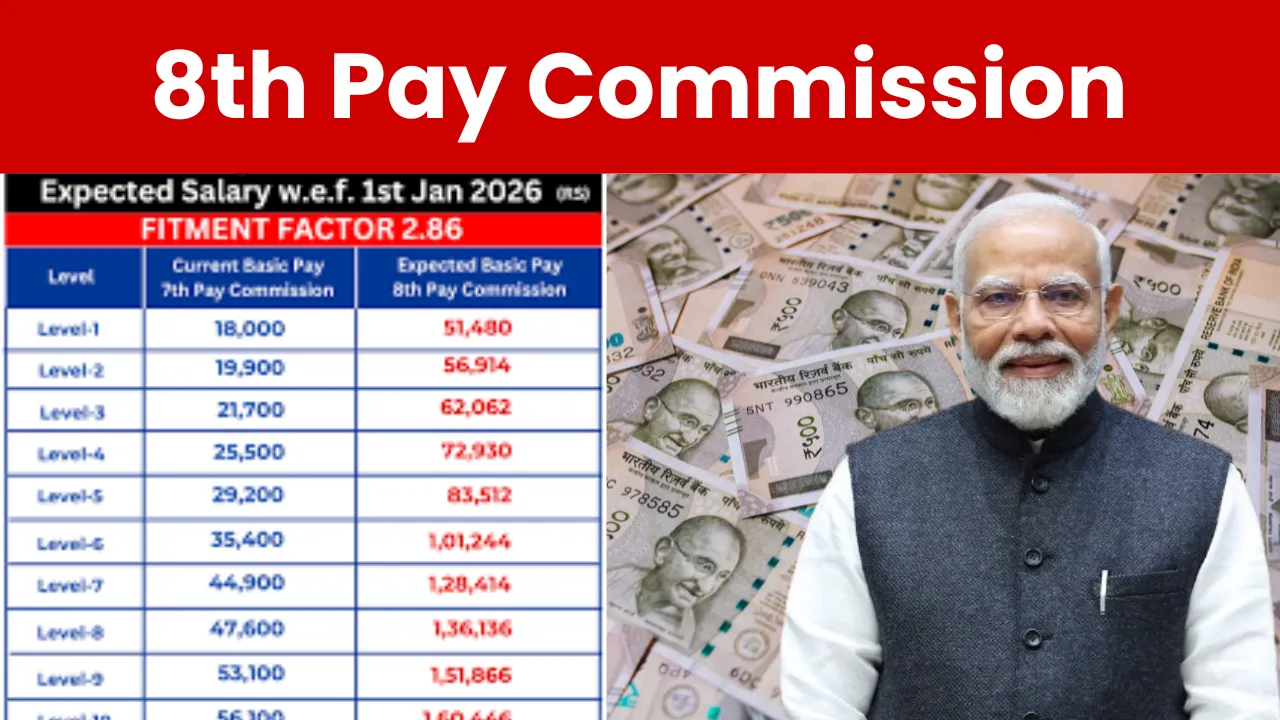8th Pay Commission: The 8th Pay Commission is already generating buzz among over 1 crore central government employees and pensioners across India. With the 7th Pay Commission implemented back in January 2016, the need for a new salary structure that reflects current economic conditions has become a priority. The cost of living has significantly increased, and government employees are eagerly waiting for an updated pay matrix.
The government officially announced the formation of the 8th Pay Commission on January 16, 2025. While the names of the panel members are still pending, the commission is expected to submit its recommendations by late 2026. If things go as planned, the new salary structure could be implemented starting January 1, 2026.
8th Pay Commission: What to Expect in 2025
The 8th Pay Commission aims to revise the salaries, allowances, and pension benefits of central government employees and pensioners. A key topic under discussion is the possible merger of the Dearness Allowance (DA) with the basic pay, which is often a standard practice before applying the fitment factor.
As of April 2025, the DA has increased to 55% after a recent 2% hike. If this is merged with the basic pay before applying the fitment factor, the revised salary could see a significant jump. For example, an employee earning ₹18,000 as basic pay could see their total earnings increase to nearly ₹79,794, depending on the fitment multiplier.
Overview Table: 8th Pay Commission Key Details
| Category | Details |
| Announcement Date | January 16, 2025 |
| Expected Recommendation Submission | Late 2026 |
| Tentative Implementation Date | January 1, 2026 |
| Current Basic Pay (Level 1) | ₹18,000 |
| Current DA (April 2025) | 55% |
| Fitment Factor Range (Expected) | 1.92 to 2.86 |
| Salary with 1.92 Fitment | ₹53,568 |
| Salary with 2.57 Fitment (7th CPC) | ₹71,703 |
| Salary with 2.86 Fitment | ₹79,794 |
| DA Merging with Basic Pay | Likely but not officially confirmed |
Key Focus: Merging DA with Basic Pay
The merging of DA with basic pay is one of the central points of conversation. In previous pay commissions, this merger laid the foundation for further salary revisions using the fitment factor. Currently, with DA standing at 55%, the merged amount becomes ₹27,900 for someone earning ₹18,000.
This merged total will likely be used as the base for applying the fitment factor, meaning government employees can expect a substantial hike once the new pay matrix is finalized.
Fitment Factor: How It Affects Salaries
The fitment factor is a key calculation tool used to determine the revised salary. It multiplies the sum of the basic pay and DA to set a new salary scale. Depending on what the commission recommends, the fitment factor could range between 1.92 and 2.86.
Here’s how it changes your salary if you’re currently earning ₹18,000:
- Fitment Factor 1.92: Salary could increase to ₹53,568
- Fitment Factor 2.57 (used in the 7th Pay Commission): ₹71,703
- Fitment Factor 2.86: Highest projected increase to ₹79,794
These estimates show how even a slight change in the fitment factor can significantly affect monthly earnings.
Why a New Pay Commission Is Essential
The need for the 8th Pay Commission goes beyond just salary hikes. Inflation and the rising cost of basic needs like food, healthcare, housing, and education have drastically reduced the real income of salaried individuals. Over the past nine years, the economic gap has widened, especially for those relying solely on government income.
Employees and unions are pushing for:
- Regular salary adjustments to match inflation
- Fairness and transparency in pay structures
- Parity with private-sector wages
- Improved retirement and pension benefits
The upcoming commission is expected to consider all these concerns while drafting new salary and pension structures.
Timeline of Developments Since January 2025
To keep things clear, here’s a timeline of what has happened so far regarding the 8th Pay Commission:
| Date | Development |
| January 16, 2025 | Formation of the 8th Pay Commission announced |
| February–April 2025 | Panel appointments and internal discussions |
| April 2025 | DA increased to 55% |
| Mid-2025 (Expected) | Finalization of panel members and terms of work |
| Late 2026 (Expected) | Submission of final recommendations |
| January 1, 2026 | Targeted implementation date |
This structured plan provides a rough idea of when the changes will likely come into effect, although exact dates may vary depending on how fast the panel works.
What’s Next for Employees and Pensioners?
While excitement is building, it’s important for employees and pensioners to stay informed but patient. As the commission moves through its phases, more updates will be released about:
- New pay bands
- Allowances and perks
- Revised pension structures
- Changes in retirement age or benefits
- Performance-linked incentives
Also, employees should closely follow DA hikes, as these will directly affect their salary when the final fitment factor is applied.
FAQs
Q1. What is the current status of the 8th Pay Commission?
The government has officially announced its formation, but panel appointments are still in progress. Recommendations are expected by late 2026.
Q2. What is the current Dearness Allowance (DA)?
As of April 2025, DA stands at 55%, following a recent 2% hike.
Q3. What is the fitment factor and how does it affect pay?
The fitment factor multiplies your basic pay (plus DA, if merged) to create a revised salary. It plays a major role in overall salary increase.
Q4. Will the DA be merged with basic pay?
While not confirmed officially, past trends suggest DA will be merged before applying the fitment factor.
Q5. When will the new salaries be implemented?
The target date is January 1, 2026, but this depends on when the panel submits its final report.
Final Thought
The 8th Pay Commission is expected to bring meaningful changes to the salaries and pensions of central government employees and retirees. If you’re currently drawing ₹18,000 in basic pay, you could see your salary go up to as much as ₹79,794, depending on the fitment factor applied. While exact figures and recommendations will only be confirmed in 2026, the signs point toward a strong salary revision that addresses inflation and fairness.
Stay tuned to official announcements, track DA changes, and make sure you’re informed as this major shift unfolds. If you found this guide helpful, feel free to share it with colleagues or comment below with your thoughts on the expected pay revision.











